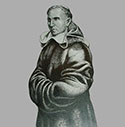By: James G. Apple, Editor-in-Chief, International
Judicial Monitor
The most popular idea about the beginnings of international
law as we know it today is that a Dutchman, Hugo de Groot, better
known as Hugo Grotius, is the “father of international law.” He is so described in
many journal articles and books which do not examine the origins of international
law very closely. In some texts, however, there is a claim that an earlier
jurist can also make a claim to that designation. His name is Francisco de
Vitoria, a Spanish Catholic priest who lived in the 15th and 16th Centuries.
Without getting into a controversy over who deserves the
name (another candidate for that title is the Italian jurist, Alberico Gentili – see International Judicial Monitor Summer 2016 issue – Leading Figures in International Law in
Archives, Home Page), suffice it to say that Vitoria did make substantial
contributions to the development of the law of nations, including some specific
doctrines.
He was born in c. 1483 in the city of Burgos, a city in
northern Spain with a historic cathedral (now a World Heritage Site). His
mother and father were both from noble families. He became a member of the
Dominican Order, the same order as St. Thomas Aquinas, in 1504. This action
enabled him to be enrolled at the College of Santiago, a school at the Sorbonne in Paris. There he
became acquainted with and influenced by the writings of Erasmus. He received
both Bachelor and Doctor degrees there, and the University conferred upon him
the highest “grade” of the Dominican Order, Master of Sacred Theology. He then
began teaching the Summa Theologica of St. Thomas Aquinas at the University of
Valladotid in Spain (one of the oldest universities). He later transferred to
the University of Salamanca, one of the most prestigious universities in the
world at that time, where he became Chair of Theology in 1526. He remained and
taught at that university until his death in 1546.
There is a university in Madrid named after Vitoria,
Universidad Francisco de Vitoria (known locally as UFV Madrid). There is an
account of Vitoria’s teachings developed by that University, as follows:
During the twenty years he spent in Salamanca,
he faced the greatest intellectual challenges of his time, renovated
intellectual methods and topics, and created a new current of
legal-theological thought which had a profound impact. His work focuses on
the concept of the dignity and moral problems of the human
condition. He was especially influential on legal issues, but his
studies on theology and aspects of the economy were also important. His
teachings have been preserved in thirteen formal lessons called
“relecciones” dedicated, among other things, to murder, marriage, civil
and ecclesiastical power, relations between the [Vatican] Council
and the Pope, war and justice [just war theory], conflicts over
the discovery of America, the incorporation of new territories to
the Spanish Crown and peace and respect in relations with the
Native Americans. These “relecciones,” written and published by
his disciples, have been preserved along with other writings.
He had the reputation of being a great teacher. He very much
opposed the Spanish policies in the New World. He influenced the thought and
work of Hugo Grotious of the Netherlands. One jurist in the United States has
suggested that Vitoria was “the first to set forth the notions of freedom of
commerce and freedom of the seas.”

 International
Judicial Monitor
International
Judicial Monitor